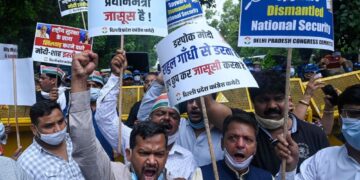 ஐரோப்பாவில் நவதாராளவாத முதலாளித்துவப் பொருளாதார அமைப்பு பொருளாதார நெருக்கடியை உருவாக்கிய பின்னர் ஐரோப்பா எங்கும் உழைக்கும் மக்களின் ஊதியங்கள் குறைக்கப்பட்டன. வாழ்க்கைச் செலவு அதிகரித்த அதே வேளை ஊதியம் அதிகரிக்கப்படவில்லை. இதனால் வறுமைச் சமூகம் உருவாகியுள்ளது. ஊதியக் குறைப்பில் முன்னணி நாடகத் திகழ்வது பிரித்தானியா என்று இன்றைய புள்ளி விபரங்கள் தெரிவிக்கின்றன. பிரித்தானியாவில் சராசரி ஒரு மணி நேரத்திற்கான ஊதியம் 2010 ஆம் ஆண்டுடன் ஒப்பிடும் போது 5.5 மடங்கால் வீழ்ச்சியடைந்துள்ளது. பிரித்தானியாவில் குவிந்திருக்கும் பல் தேசிய நிறுவனங்கள் சில்லரை வணிகம் போன்ற அடிப்படை வர்த்தகத்தைக் கூட விட்டுவைக்கவில்லை. அனைத்து அதிகாரமும் கொண்ட இந்த நிறுவனங்களின் தொழிலாளர் சட்டங்களைக் கூட மாற்றியமைக்கும் சக்தி வாய்ந்தவை. என்ற நான்கு பிரதான நிறுவனங்களே பிரித்தானிய அரசாங்கத்தின் வரி மற்றும் நிதி ஆலோசனை வழங்கும் நிறுவனங்கள். இவர்களின் ஆலோசனையின் அடிப்படையிலேயே வர்த்தகம் குறித்த பிரித்தானி அரசின் கொள்கை வகுக்கப்படுகின்றது. இதே நிறுவனங்களே பல்தேசியப் பெரு நிறுவனங்களின் ஆலோசகர்களும் கூட. இந்த நிறுவனங்களே சிறிய மற்றும் நடுத்தர வர்த்தகங்களை அழிப்பதற்கும், மக்களிடமிருந்து அதிக வரி அறவிடுவதற்கும், மலிவான கூலிக்கு உழைப்பைச் சுரண்டிக்கொள்வதற்குமான திட்டங்களை வகுத்துக்கொள்கின்றன. இவ்வாறான பல்தேசியச் சுரண்டலுக்கு ஏற்ற பொறிமுறை பல்வேறு தளங்களிலும் உருவாக்கப்படுகின்றது.
ஐரோப்பாவில் நவதாராளவாத முதலாளித்துவப் பொருளாதார அமைப்பு பொருளாதார நெருக்கடியை உருவாக்கிய பின்னர் ஐரோப்பா எங்கும் உழைக்கும் மக்களின் ஊதியங்கள் குறைக்கப்பட்டன. வாழ்க்கைச் செலவு அதிகரித்த அதே வேளை ஊதியம் அதிகரிக்கப்படவில்லை. இதனால் வறுமைச் சமூகம் உருவாகியுள்ளது. ஊதியக் குறைப்பில் முன்னணி நாடகத் திகழ்வது பிரித்தானியா என்று இன்றைய புள்ளி விபரங்கள் தெரிவிக்கின்றன. பிரித்தானியாவில் சராசரி ஒரு மணி நேரத்திற்கான ஊதியம் 2010 ஆம் ஆண்டுடன் ஒப்பிடும் போது 5.5 மடங்கால் வீழ்ச்சியடைந்துள்ளது. பிரித்தானியாவில் குவிந்திருக்கும் பல் தேசிய நிறுவனங்கள் சில்லரை வணிகம் போன்ற அடிப்படை வர்த்தகத்தைக் கூட விட்டுவைக்கவில்லை. அனைத்து அதிகாரமும் கொண்ட இந்த நிறுவனங்களின் தொழிலாளர் சட்டங்களைக் கூட மாற்றியமைக்கும் சக்தி வாய்ந்தவை. என்ற நான்கு பிரதான நிறுவனங்களே பிரித்தானிய அரசாங்கத்தின் வரி மற்றும் நிதி ஆலோசனை வழங்கும் நிறுவனங்கள். இவர்களின் ஆலோசனையின் அடிப்படையிலேயே வர்த்தகம் குறித்த பிரித்தானி அரசின் கொள்கை வகுக்கப்படுகின்றது. இதே நிறுவனங்களே பல்தேசியப் பெரு நிறுவனங்களின் ஆலோசகர்களும் கூட. இந்த நிறுவனங்களே சிறிய மற்றும் நடுத்தர வர்த்தகங்களை அழிப்பதற்கும், மக்களிடமிருந்து அதிக வரி அறவிடுவதற்கும், மலிவான கூலிக்கு உழைப்பைச் சுரண்டிக்கொள்வதற்குமான திட்டங்களை வகுத்துக்கொள்கின்றன. இவ்வாறான பல்தேசியச் சுரண்டலுக்கு ஏற்ற பொறிமுறை பல்வேறு தளங்களிலும் உருவாக்கப்படுகின்றது.












It is a matter of survival of the Euro Dollar and the Bank of England and the British Sterling Pound. The European Union will survive. Now the Tory conservative government embarked on frugality. The British are also used to pampering. Do this affect us here in Sri Lanka is all that matters to me.
Why are wages so low in England…???
The main problem is more to do with Taxes still being too high after a group of spiteful socialists more commonly known as the Labour party (headed by Tony Blair, then Gordon Brown) being in charge of the country from 1997 – 2010 (Who also introduced the Minimum wage in that time).
http://www.htspweb.co.uk/garbagegate/ite…
http://rogerhelmermep.wordpress.com/2012…
http://blogs.conservativechitchat.co.uk/…
On top of that there is also the national debt they built up to cover, but the deficit to get shot of before that so that the Government isn’t spending more money than they’re bringing in with tax payments.
http://conservativehome.blogs.com/platfo…
Also the same Labour party fiddled the way that National inflation was measured to try make it look as though the economy & costs of living was doing better than it really is.
http://johnredwoodsdiary.com/2007/01/23/…
http://johnredwoodsdiary.com/2011/01/13/…
Oh yes, and then there was the mass influx of uncontrolled immigration the last Labour government seemingly let happen on purpose, which also kept wages down.
http://www.dailymail.co.uk/news/article-…
http://www.dailymail.co.uk/news/article-…
http://www.dailymail.co.uk/news/article-…
Wages here aren’t low……. £6 an hour, or teensy bit under… some jobs pay more, others pay bang on minimum wage of £5.86 or whatever it is.
£6 = $9.57 (US) an hour.
Source(s):
http://www.conservativechitchat.co.uk/ht…
Typically when taxes are higher wages tend to behigh too. Ausstralia can be good example. I am not sure what is being said here, in one place it says the wages are low and elsewhere it says not.
Karl Marx predicted the crisis one and a half centuries ago:
As a definition, it is the percentage and the relation between variable and constant capital, between the fixed cost a
nd the material and goods’
value, demonstrated in the production of commodities to the labour power used inmanufacturing (Cockshott and Cottrell, 2003).Moreover, the percentage of profit would be regenerated and re-established only after a substantial deflation or destruction of capital alongside with large-scale unemployment andlow level of salaries. Therefore, Marx was aware with generalised crisis, and within thesecrises, he tried to explain monetary and financial disorder and confusion. According toHensman (2008) Marx was aware that crises were expected-
“inevitable”
– in capitalism. This
indicates that he believed in “crisis in the accumulation of capital”
8
, which leads to thecurre
nt economy or our real economy as “which has a system of production
not for the
human need but only for profit”.
9
This shows that in the contemporary issues, we have a realeconomic crisis, referred to the whole current economic system, not only financial crisis.Marx draws up schemas for the social reproduction of capital, and they include onlytwo departments of capital: 1) one department is producing means of production; 2) onedepartment is producing means of consumption. This leads to
3) “Social useful production”,
which is the goods and services from the first and the second departments re-enter
production again, which is the capitalists’ consumption, some part of the surplus values goes
to the capitalist themselves (Volume 2 ), (Hensman, 2008). An example for this, that thestates provide cheap services like: railways, health insurance, education, and there is no profit
or investment have been made, Capitalism still benefits from them, “the reason is
governments provide these services with cheap prices and h
igh quality inputs”
10
. Another example is of regulation in the interest of capitalist profits is, medicine and pharmaceutical
6
See Hensman (2008), Marxism And the Economic Crisis.
7
See Hensman (2008), Marxism And the Economic Crisis.
8
See Hensman (2008), Marxism And the Economic Crisis.
9
See Hensman (2008), Marxism And the Economic Crisis.
10
See Hensman (2008), Marxism And the Economic Crisis.
POL8018
Global economic crises: Marx and Keynes’ views
109239639
5
companies can make obscene profits by selling life-saving drugs at prices that condemn most patients who desperately need these products (Hensman, 2008).In addition, this shows that Neoliberal policies have resulted in this market diversion(or I might call it disruption). This type of disruption has been addressed by many scholars,
one of them Jan Berman, who states that “It is mis
take to think that neoliberalismconstitutions deregulation of the market; it is, rather, a regulation of the market in the
interests of the owners of capital”
11
. For example, in the UK banking industry, many of CEOs and senior workers were under investigation by the authorities; in this case theauthority is the Financial Services Authority in the UK. The reason was, some of the senior workers set a series of electronic exchanges linked some of the British banks withinternational banks and corporations in order to make more profit from the currencyexchange trade process. They have been found guilty for manipulating the fixed or the keyrate. By doing this, they were illegally able to make vast quantities of money. The reasonwas, they were frequently providing either false high rates or false low rates to more than teninternational banks and businesses (Treanor, 2013). Therefore, regarding to this, some bankshave been fined large bills for
violating the exchange trade regulation, example, “Royal Bank
of Scotland RBS fined £390m for manipulating [the]
rate”
12
, however, some of the senior workers still walked away with high salaries. This shows another example of regulation in theinterest of capital profits. Furthermore,
many individual inventor’s right
s have been abusedthrough a lack of protection in copyright and patent laws which have allowed largecompanies and businesses to take others innovations and discoveries as their own; againreflecting the interests of capitalist profits over labour rights (Hensman, 2008: p 3).This shows that Marx
’s
ideas are great examples for class struggle. In this sense, itmight be obvious that there are high class, wealthy class; on the other hand, there is a lowclass, poor class living in poverty
’s line or maybe
lower. For Marx, inequality and poverty donot make the employees and workers to take stance against capitalist system. According tohim, this has always been
a major part, debatably, of “healthy” capitalist economy, whereas,
security and stability are required to avoid any economic crisis, which might be in this sense
“political
–
economic hegemony”.
As a reflection
, according to Easterling (2003) “greater
11
See Hensman (2008), Marxism And the Economic Crisis.
12
See Treanor, (2008), cited in the Guardian, 2013
POL8018
Global economic crises: Marx and Keynes’ views
109239639
6
social and ideological impact is the insurity, instability and ruin that economic crisis periodically inflict on the lives of working-
class”.
13
In addition,
Militarism
is another element that might have a strong connection to anyeconomic crisis. Militarism seems to be an industry that produces and provides militaryequipment for military needs and usage only. This means, militarism is a major production, but it is neither profitable nor directly supports public needs. As mentioned before, the previous military operations and military deploy by the US-international coalition may haveheavily contributed to the 2008 global economic crisis. For example, a similar situationhappened before in terms of militarism. In regards to the Cold War between the West andEast, (US and the former USSR), a report has been released by the Central Intelligence
Agency (CIA) “seeks to alter not the US’ President military strategy itself, but its excessive proportions”. (Socialist Voice, 1983: 1). However, Marx did not recognise the impact of
militarism as a negative impact on capital. He acknowledged it to be destructive and harmfulonly on the working class, which is again evidence that capitalism works only in the interestsof the capitalist themselve
The Economic Collapse Of 2013 Is Around The Corner :